A Fly on the Wall at the Lincoln-Douglas Debates…
April 18, 2022 by GuyHeilenman · Leave a Comment
 As I sat down to write this post, I was reminded that a year ago I wrote another post titled “A Fly of the Wall …” which ironically, was also about Lincoln. This time Lincoln had an adversary who also drew me in – who made me, once again, desire to be a fly on the wall.
As I sat down to write this post, I was reminded that a year ago I wrote another post titled “A Fly of the Wall …” which ironically, was also about Lincoln. This time Lincoln had an adversary who also drew me in – who made me, once again, desire to be a fly on the wall.
On August 26, 1858, THE NEW YORK TIMES reported on the now-famous Lincoln-Douglas debates. While coverage of the debates is difficult to find in newspapers because it was a senate race and Lincoln was, at this time, still a relatively unknown figure in American politics, sometimes you find a gem. Page 5 contains a report headed: “Douglas and Lincoln at Ottawa–Personal Reminiscences” which begins: “Messrs. Douglas and Lincoln had a grand tilt at Ottawa, Ill., last week. Mr. Douglas’ speech contained this amusing passage:…”, and what follows is an excerpt of a Douglas’ speech. There is something particularly engaging about two great thinkers, with many polar-opposite views, battling it out with their most useful weapons: words. Go ahead and admit it, you wish you could have been a fly right there with me.
A February, 2017 stroll back thru time – 50, 100, 150, 200, & 250 years ago…
February 6, 2017 by GuyHeilenman · Leave a Comment
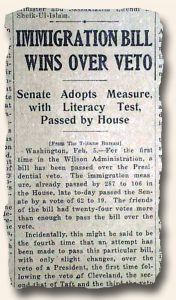 What news was reported in the month of February – 50, 100, 150, 200, and 250 years ago (1967, 1917, 1867, 1817, 1767)? Such a walk back through time via the eyes of those who read the daily and weekly newspapers of the period can be quite revealing. This is why we often say, “History is never more fascinating than when it’s read from the day it was first reported.” The following links will take you back in time to show the available newspapers from the Rare & Early newspapers website. There’s no need to buy a thing. Simply enjoy the stroll.
What news was reported in the month of February – 50, 100, 150, 200, and 250 years ago (1967, 1917, 1867, 1817, 1767)? Such a walk back through time via the eyes of those who read the daily and weekly newspapers of the period can be quite revealing. This is why we often say, “History is never more fascinating than when it’s read from the day it was first reported.” The following links will take you back in time to show the available newspapers from the Rare & Early newspapers website. There’s no need to buy a thing. Simply enjoy the stroll.
A Three Stooges skit on the House floor…
January 24, 2014 by TimHughes · 1 Comment
“The New York Times” of February 6, 1858 reports a brawl on the floor of the House of Representatives the day before. Although perhaps not as infamous as the Charles Sumner/Preston Brooks attack, this one between Lawrence Keitt and Galusha Grow was more raucous.
The photo below reports some of the exchange of words between the two, but the better report is found in the Wikipedia account of the affair: “A large brawl involving approximately 50 representatives erupted on the House floor, ending only when a missed punch from Rep. Cadwallader Washburn of Wisconsin upended the hairpiece of Rep. William Barksdale of Mississippi. The embarrassed Barksdale accidentally replaced the wig backwards, causing both sides to erupt in spontaneous laughter.” The entire NY Times coverage may be viewed at: “The New York Times” of February 6, 1858
Collecting 19th Century… Pre-Civil War… Hidden gems abound…
May 17, 2013 by GuyHeilenman · Leave a Comment
An era rich in history… with hidden gems throughout…
Many rare newspaper collectors focus on the more memorable eras of history such as the Revolutionary War, the Civil War, or World War II. Brief date periods –as war events tend to be—can allow for a more concise collection without becoming unduly large if one concentrates on just the major events. Consequently, less notable eras often get over-looked without realizing there is a treasure trove of events which are both fascinating and historically significant found in period newspapers, and well within the range of the average collector.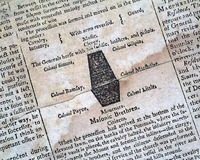
One such era would be the 1800-1860 period which we designate on our website as the “Pre-Civil War Era”. This was a transitional time in American history as the events of the Revolutionary War and the struggles with creating the federal government gave way to a more secure nation and a more independent America as the nation grew in both size and complexity.
This sixty year era offers a great wealth of events which were formative for the American landscape. The century began with continual coverage of the funeral of George Washington who died less than 3 weeks before the new century began. Thomas Jefferson was the first President to be elected in the 19th century and he did not escape the headaches of war, as the “Barbary Wars” fell within his tenure. He also lead the charge for the Louisiana Purchase which more than doubled the size of the nation and would be home, in full or in part, for 15 new states that would eventually join the Union. Newspaper reports on the Lewis & Clark Expedition were few and far between, but finding even brief mentions in a period newspaper can be quite a thrill.
As the country grew a wealth of notable events transpired & were noted in newspapers of the day. Presidential elections and inauguration are always popular, and there were many in this era: Jefferson, Madison, Monroe, John Quincy Adams, Jackson, Van Buren, William Henry Harrison, Tyler, Polk, Taylor, Fillmore, Pierce, Buchanan, and of course Lincoln, who was elected in this era, but would be inaugurated in the “Civil War Era”, a fascinating chapter of American history onto itself. For those who like to have :complete” collections, finding every election and inauguration is a doable quest.
The War of 1812 falls within this era and provides an opportunity for a sizable and notable collection on its own, from the declaration of War to the many naval battles, the attacks on Baltimore & Washington, the significant battle of New Orleans, and the treaty which ended the war. Collectors like that war events typically allow for collection “bookends” (war declaration and treaty of peace), between which they can become as focused as their budget will allow in collecting the major events.
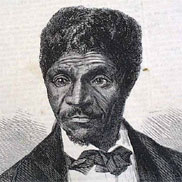 The slavery issue would remain a stain on the American fabric during this era, with events such as the Denmark Vesey and Nat Turner insurrections, and the more notable John Brown raid at Harper’s Ferry, as lead-ins to the Civil War. Abolitionist newspapers would be created, including the Liberator & the Emancipator among others, and names such as Frederick Douglass, Dred Scot, and William Lloyd Garrison would make their marks in American history forever. And it was very much a political issue as well with the Missouri Compromise being just one of several federal decisions which had slavery as a basis. Relations with the Native Americans were troubling also, with the Seminole War, the “Trail of Tears”, and the many broken treaties commonly reported in newspapers of the day.
The slavery issue would remain a stain on the American fabric during this era, with events such as the Denmark Vesey and Nat Turner insurrections, and the more notable John Brown raid at Harper’s Ferry, as lead-ins to the Civil War. Abolitionist newspapers would be created, including the Liberator & the Emancipator among others, and names such as Frederick Douglass, Dred Scot, and William Lloyd Garrison would make their marks in American history forever. And it was very much a political issue as well with the Missouri Compromise being just one of several federal decisions which had slavery as a basis. Relations with the Native Americans were troubling also, with the Seminole War, the “Trail of Tears”, and the many broken treaties commonly reported in newspapers of the day.
The Texas Revolution of 1835-1836 has a spice of historical romance similar to the events of the Old West, as both were dramatized in movies. The memorable Battle of the Alamo (starring John Wayne on the big screen) and its fiercely heroic soldiers & citizens, who knowingly faced death to establish the independence of Texas, remains a proud moment in not just Texas but American history. The battles which lead up to that event, and those which followed can be found in newspapers of the day, and mention names we remember from history books including Sam Houston and Davy Crockett.
The Mexican War was another event which resulted in the expansion of the nation with all the major battles reported in newspapers of 1846 to 1848. Just a few years latter attention focused once more on the West with the California Gold Rush and all the romance of a nation heading west to find their fortune. The newspapers reported those thrills, but also reported the struggles & hardships which would befall the many on the trek to the West. Newspapers of the day were more frank than were history books 100 years later.
Westward expansion wasn’t limited to the battle fronts or the quest for gold, as the Missouri River Expedition, The Yellowstone Expedition, the Rocky Mountain exploration, and reports on the Santa Fe Trail were all reported as the adventurous were discovering and creating history—and reported first in newspapers of the day. Such expansion was responsible for states to be created, and reports of statehood for Alabama, Indiana, Michigan, and Illinois among others were detailed in newspapers, as were reports of changes needed in the United States flag to honor such additions.
The Erie Canal, creation of the cotton gin and the Pony Express were notable events during this period. Famous names were commonly found as their reports were making history & reported in newspapers as such, including the likes of Daniel Boone, John Jacob Astor, Bolivar, John Jay, Henry Clay, Horace Greeley, and Kit Carson to name but a few. Of special intrigue is finding reports of famous names before they became famous, such as inconspicuous mentions of Abraham Lincoln from 1848 when he was a member of Congress, or Jefferson Davis from 1833, nearly 30 years before becoming President of the Confederacy.
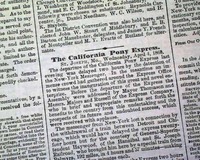 Judaica interest, reports of pirates, the Black Hawk Indian War, runaway slaves, William Henry Harrison’s one month Presidency, and the earliest reports of the Mormons and the journey across the country provide fascinating reading in newspapers of the pre-Civil War era. The Monroe Doctrine is just one of an endless list of historical documents and landmark Supreme Court decisions which were reported in newspapers of the day. Early newspapers from Hawaii, Florida, and Kentucky among others, more commonly found after the 1870’s are a special treat when found before the Civil War. And more than American history found their way into American newspapers. The Battle of Waterloo and the other Napoleonic Wars with mention of Buonaparte, Wellington and other key European figures put world history into perspective when such reports are found alongside notable events in American history.
Judaica interest, reports of pirates, the Black Hawk Indian War, runaway slaves, William Henry Harrison’s one month Presidency, and the earliest reports of the Mormons and the journey across the country provide fascinating reading in newspapers of the pre-Civil War era. The Monroe Doctrine is just one of an endless list of historical documents and landmark Supreme Court decisions which were reported in newspapers of the day. Early newspapers from Hawaii, Florida, and Kentucky among others, more commonly found after the 1870’s are a special treat when found before the Civil War. And more than American history found their way into American newspapers. The Battle of Waterloo and the other Napoleonic Wars with mention of Buonaparte, Wellington and other key European figures put world history into perspective when such reports are found alongside notable events in American history.
If capturing history in the pages of the nation’s newspapers is your hobby, certainly there is much from the 1800 – 1860 period to excite any historical hobbyist. Do not overlook this fascinating era in the growth & development of the United States of America.
Antebellum American Newspapers… AAS…
April 11, 2011 by GuyHeilenman · Leave a Comment
Vincent Golden of the American Antiquarian Society, recently produced a video which describes the history and characteristics of Antebellum American newspapers. We thought our readers might enjoy this informative piece, from the Curator of the AAS: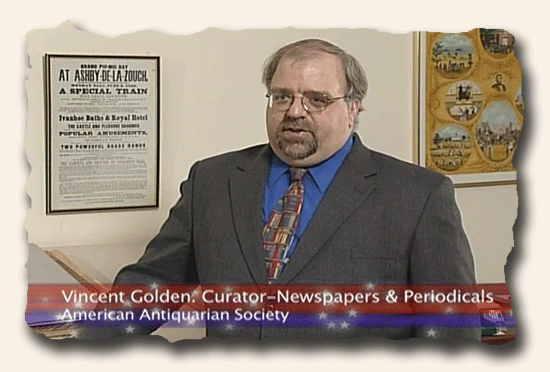
Antebellum American Newspapers from American Antiquarian Society on Vimeo.
Most historic pre-Civil War 19th century event…
December 15, 2008 by TimHughes · 3 Comments
Continuing with our discussion on the “most historic” reports to be found in newspapers, we have been discussing the events of American history by era, the last being the Civil War. This post will discuss the most significant event in American history of the 1801 – 1860 era.
Much in American history happened during these 60 years: from the Louisiana Purchase in 1803, the War of 1812 from 1812-1815, the Texas war for independence of 1836, the Mexican War of 1846-1848, the California Gold rush of 1949+, and the events leading up to the Civil War to name just a few.
But what single event during the period of 1801 – 1860 would rank as the most significant in American history? If you could only have one newspaper from the pre-Civil War era in your collection, what one event would you most desire to best represent the era and–in your opinion–most affected the future of American history?
 Arguments could be made for many events including those noted above, but also perhaps also the Monroe Doctrine of 1823, maybe a single event from the War of 1812, or the battle of the Alamo, or the treaty ending the Mexican War, or the Cherokee Trail of Tears, or perhaps even John Brown’s raid at Harper’s Ferry that would happen just before the outbreak of the Civil War.
Arguments could be made for many events including those noted above, but also perhaps also the Monroe Doctrine of 1823, maybe a single event from the War of 1812, or the battle of the Alamo, or the treaty ending the Mexican War, or the Cherokee Trail of Tears, or perhaps even John Brown’s raid at Harper’s Ferry that would happen just before the outbreak of the Civil War.
In my opinion the Louisiana Purchase was the most significant. This purchase from France would double the land area of the United States and in time 13 states would be carved from it. The explorations of Lewis & Clark and the subsequent Westward migration of so many from the East would transform the nation in so many ways that its significance cannot be ignored. To me it was the most significant event in American history from 1801 to 1860.
What’s your thought? We would all love to hear.


